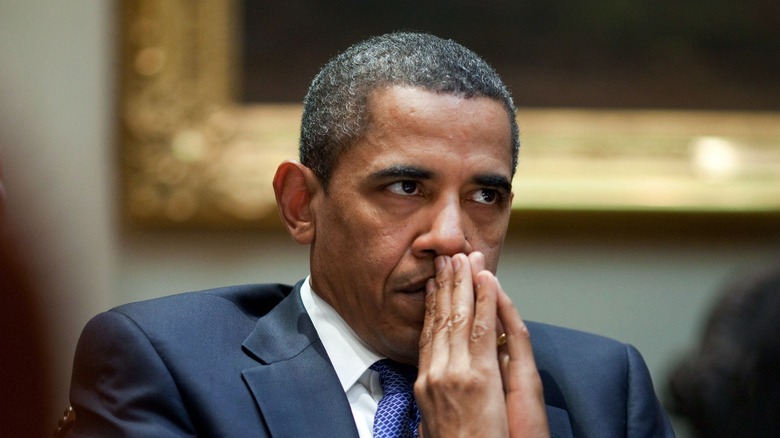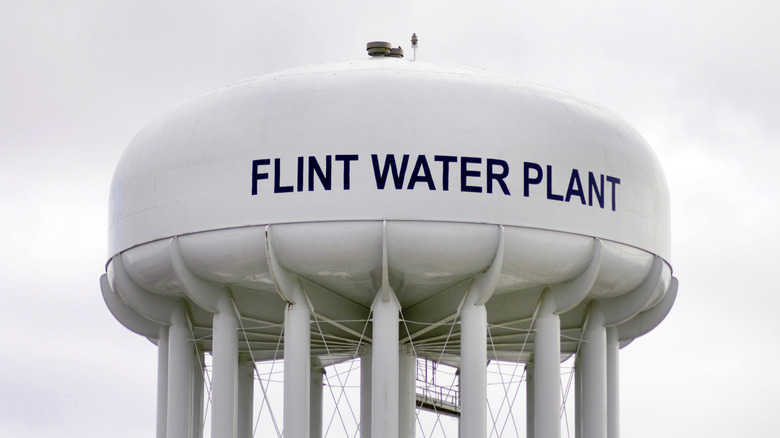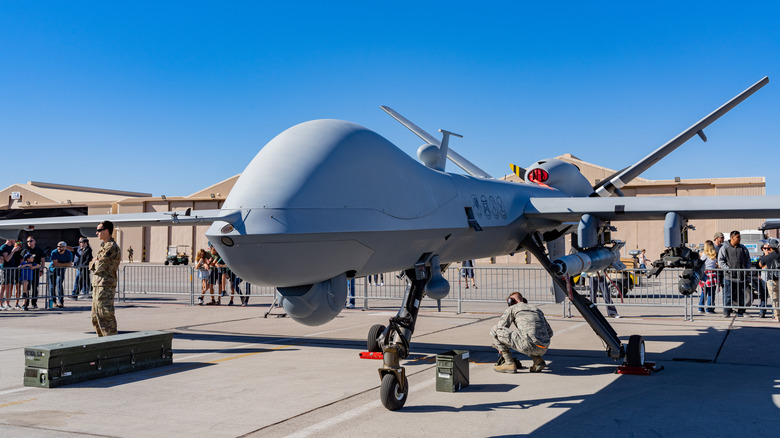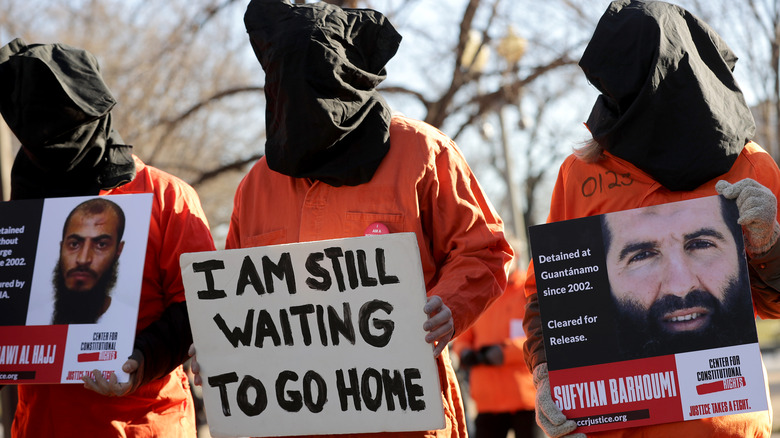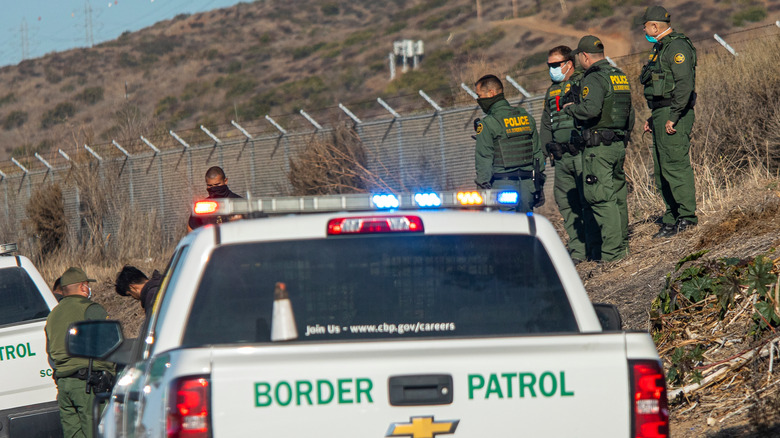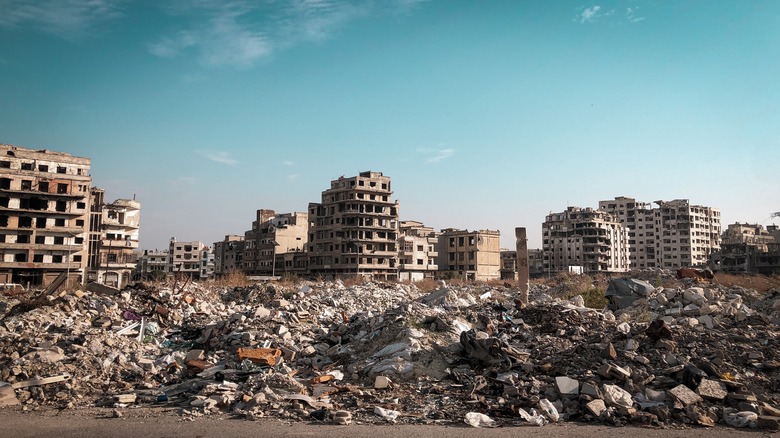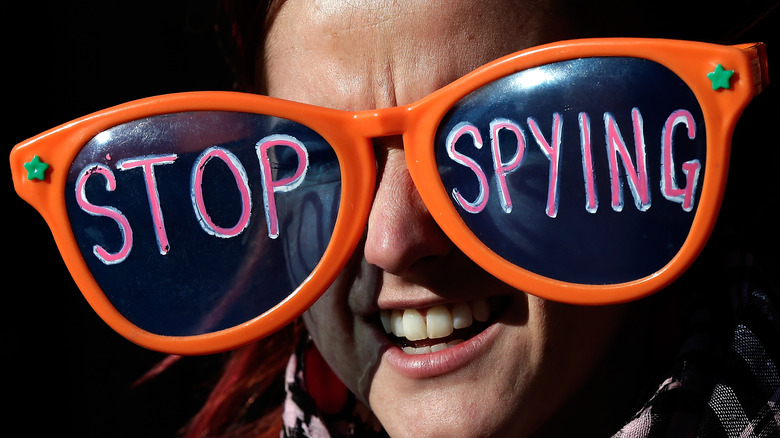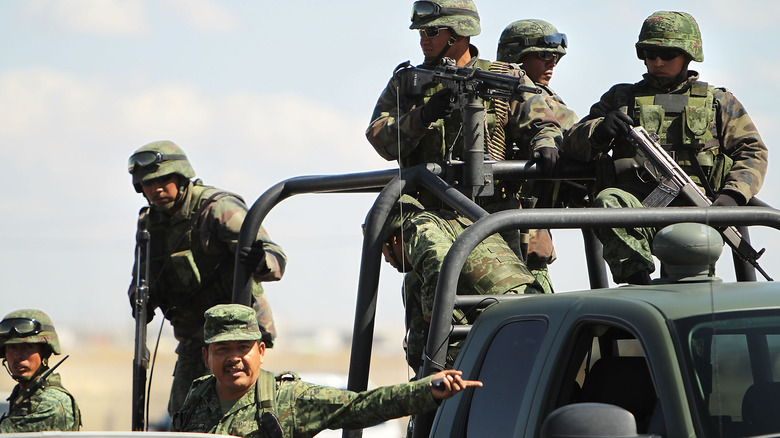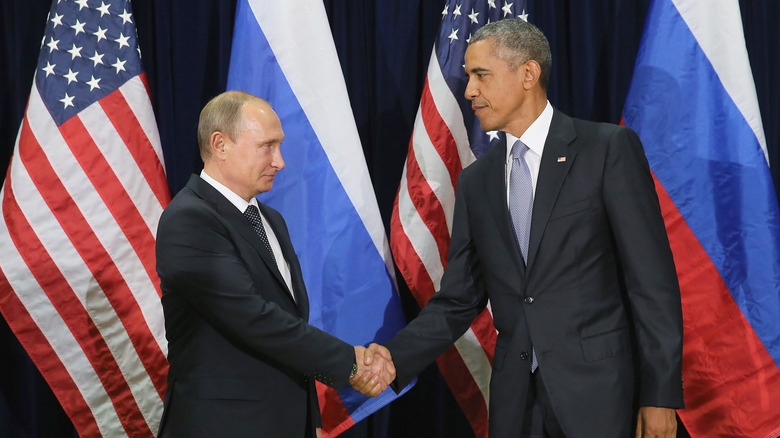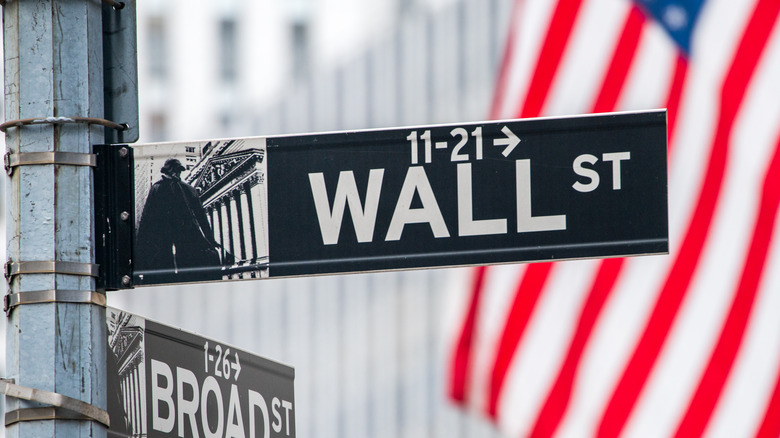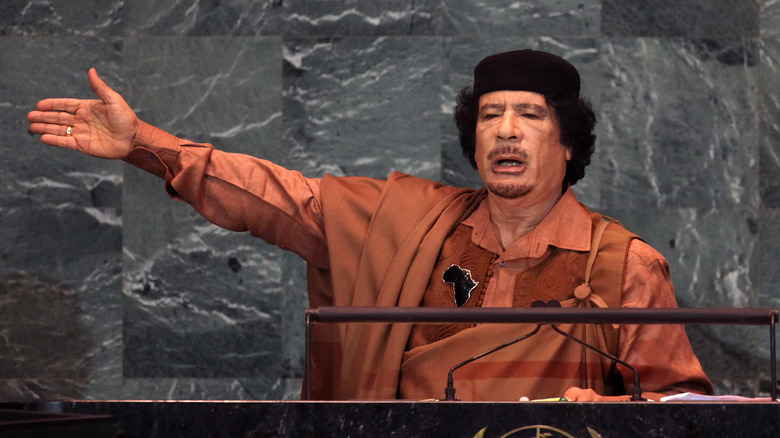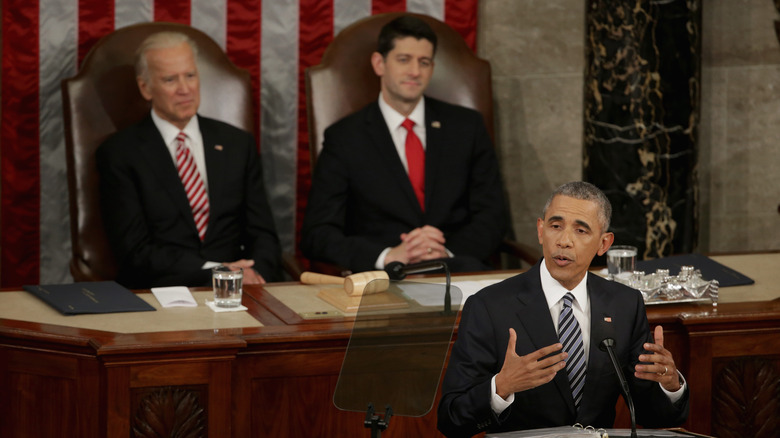Questionable Things About Barack Obama's Presidency
American presidents are among the most scrutinized people on Earth. They are questioned before, during, and long after their days in office. Barack Obama, first elected in 2008, is one of the most recent presidents to feel the full force of this scrutiny. What were his intentions in running for office? How did he perform on the job? What is the meaning of his legacy?
So far, the answers to these questions appear to be broadly positive. In 2018, a poll by the Pew Research Center found that 44% of Americans considered Obama to be the best or second-best president of their lifetimes. Later, in 2021, CSPAN ranked Obama as the 10th-best president in American history. However, questions remain about Obama and his administration. Was he soft on Russia? Did he hold Wall Street accountable? What was "Operation Fast and Furious" all about? Here are some questionable things about Obama's presidency.
Obama's leadership during the Flint water crisis
In 2014, it transpired that the water supply of Flint, Michigan was polluted with a range of contaminants, namely lead, that caused skin rashes, hair loss, and potentially a Legionnaire disease outbreak. The pollution started when Michigan Governor Rick Snyder switched the city's water supply from Detroit Water and Sewerage Department (DWSD) to the Flint River (via Britannica). In June 2016, after two years of crisis, the Environmental Protection Agency (EPA) announced that Flint's water was finally safe to drink.
Much of the blame was placed on Governor Snyder. However, some were also critical of then-president Barack Obama. Penning an op-ed in The Guardian, EPA whistleblower Marsha Coleman-Adebayo described the reaction to the Flint water crisis as a "shadow on Obama's legacy." She criticized Obama for visiting the city only two years after the crisis had started and questioned why he didn't do more to rebuke EPA chief Gina McCarthy, who had failed to seize control of Flint's tainted drinking water system.
During his visit in May 2016, Obama paused his speech to ask for a glass of water, which he drank in an effort to reassure locals. However, according to documentarian Anthony Baxter, some viewed this as a flippant stunt. "I think the African American community in Flint just felt so devastated by that," Baxter said, "There was so much hope placed on Obama's visit and to see him misread the situation in that way was really surprising."
He authorized the assassination of a U.S. citizen
In April 2010, Barack Obama approved the killing of radical Muslim cleric and American citizen, Anwar al-Awlaki. Writing in The New York Times, reporter Scott Shane described this as an "extraordinary step," adding that it was "extremely rare, if not unprecedented, for an American to be approved for targeted killing." By approving al-Awlaki's killing, Obama had officially designated the cleric as a military enemy of the United States and therefore waived his protection from political assassination, which was banned during Gerald Ford's presidency.
On September 30, 2011, al-Awlaki was killed by a U.S. drone strike in Al-Jawf province, Yemen (via Britannica). Some commentators were concerned by this killing, which, as Ray Suarez explained on PBS News Hour, was committed "without charge, without indictment — obviously without trial." Geopolitical commentator Brian Fishman, in an interview with Suarez, said that he had "real concerns" about the killing because it "set a precedent." Fishman argued that rather than just killing him, the government should have exercised some due process and outlined al-Awlaki's actions. This, Fishman reasoned, would have exposed al-Awlaki's hypocrisy, such as his solicitation of sex workers, which was not compliant with his supposed radical Islamism. This could have harmed his reputation among followers, whereas his death likely formed some degree of martyrdom (per The New York Times).
Obama granted immunity to torturers
Writing in The Guardian, journalist Glenn Greenwald criticized the Obama administration's "aggressive, full-scale whitewashing of the 'war on terror' crimes committed by Bush officials." She criticized the reprieve given to those investigated for the deaths of two detainees, Gul Rahman and Manadel al-Jamadi, at detention centers in Kabul and Abu Ghraib, respectively. In August 2012, Attorney General Eric Holder announced (via the U.S. Department of Justice) that all criminal charges had been dropped in the investigation regarding Rahman and al-Jamadi.
During his presidential campaign, Barack Obama said he would ask his attorney general to "immediately review" the crimes of the Bush administration, according to the Philadelphia Inquirer. However, in the weeks before he took office, Obama started to backtrack on the subject, telling George Stephanopoulos (via ABC News) he believed that "we need to look forward as opposed to looking backwards." Months later, The New York Times reported that Obama had also said, "I don't want [the CIA] to suddenly feel like they've got spend their all their time looking over their shoulders."
This cagey approach was again put under the spotlight with a case from the United Kingdom. The British High Court ruled that Binyam Mohamed, a British resident, had been subjected to "brutal torture" in U.S. detention (via Salon). The Obama administration responded by threatening to withhold intel on potential terrorist attacks, which caused Britain to curtail its public disclosure of Mohamed's treatment.
Obama deported people at higher rates than Trump
Donald Trump is known for his incendiary rhetoric about immigration. However, Immigration and Customs Enforcement (ICE) deported people at a greater rate during the Obama administration than the agency did during the term of his successor. In November 2019, some three years into Trump's presidency, The Washington Post reported that deportations were still lower than in the Obama era. Later, in 2021, The Economist estimated that Obama had deported over 60% more people in his first term than Trump did. This record earned Obama the moniker "deporter in chief."
Doubts have also been cast over Obama's immigration priorities. Commenting on deportation policy, Obama said (via The White House) that he was after, "Felons, not families. Criminals, not children. Gang members, not a mom who's working hard to provide for her kids." However, Homeland Security statistics show that many deportees were of "non-criminal" status. Furthermore, many of those who did have "criminal" status had only low-level charges for marijuana possession and other misdemeanors.
His red line moment with Syria
The war in Syria is perhaps what has been judged as Barack Obama's biggest failure. David Greenberg (via Foreign Policy) argued that Syria will "stain Obama's legacy forever," while foreign correspondent Rupert Cornwell (via The Independent) described Obama's policy as a "complete and utter failure," adding that he looked, "weaker and less effectual on the world stage than any of his predecessors since Jimmy Carter."
Obama maintained that he would marshal U.S. power to oust Bashar al-Assad as president of Syria. However, this never happened, for the Obama administration did not supply adequate provisions to rebel groups and it did not establish a sanctuary in northern Syria. Obama lost even more face following an August 2012 speech in which he described the use of chemical weapons as a "red line" which, if crossed, would have "enormous consequences." However, when it was confirmed that Assad had used chemical weapons, Obama canceled a punitive strike (via The Atlantic).
In an interview with PBS, former anti-Soviet dissident Natan Sharansky argued that Obama's "red line" rhetoric emboldened Vladimir Putin: "That's when Putin decided that he could bring troops to Syria ... and then to go to Crimea." Sharansky concluded that leaders should be "very clear" in their opposition to unconventional weapons and be willing to take decisive action.
Obama had two opposite approaches to mass surveillance
In 2005, then-Senator Barack Obama spoke of the PATRIOT Act jeopardizing "the rights of all Americans and the ideals America stands for" owing to its surveillance powers. However, in 2010, President Obama extended several controversial aspects of it, including Section 215, which allowed the government to access customer records from private sector companies, like telecommunications (via PBS). Two years later, Obama granted a five-year extension of the FISA Amendments Act, which he had threatened to filibuster as a senator.
These events came to a head in 2013, when Edward Snowden leaked troves of highly classified information that unraveled Obama's relationship with the intelligence establishment. The documents showed the Obama administration was engaged in mass surveillance of the American populace and had a special relationship with Verizon, which handed over all telephone data to the National Security Agency (NSA) on an "ongoing, daily basis" (via The Guardian).
On June 7, 2013, Obama explained (via PBS) that Americans couldn't have "100% security and also then have 100% privacy and zero inconvenience," adding, "We're going to have to make some choices as a society." Obama may have struck a pragmatic tone during that press conference, but he likely had a harder time during a phone call with Angela Merkel, who demanded to know if the NSA had bugged her phone. The German chancellor was said to be "livid" about the privacy breach, which was substantiated by credible reports by German intelligence authorities, per The Guardian.
He shifted blame for the Fast and Furious gun scandal
During Barack Obama's first term, the president was embroiled in a Mexican gun-running scandal named Operation Fast and Furious, which Forbes suggested could be "President Obama's watergate." This parallel was not realized, but the details of Fast and Furious certainly remain questionable.
Operation Fast and Furious was designed to sell traceable firearms to stateside cartel representatives, who would then slip over the border to Mexico and distribute the weapons. In theory, this would allow the Bureau of Alcohol, Tobacco, Firearms, and Explosives (ATF) to track criminals with greater accuracy. In practice, however, it lead to the murder of countless Mexicans and U.S. Border Patrol agent Brian Terry, who was shot dead by one of the ATF firearms (via National Review).
On September 20, 2012, Obama told reporters in Miami that the "Fast and Furious program was a field-initiated program begun under the previous administration." However, this was proven false by PolitiFact, which pointed out that while the Bush administration had similar initiatives, Operation Fast and Furious began in October 2009, some 10 months into Obama's presidency.
He was criticized for being soft on Russia
Some political commentators — like Jorge Benitez, a NATO expert on the Atlantic Council — argue (via Business Insider) that Obama was soft on Russian aggression. Many have cited Vladimir Putin's 2014 annexation of Crimea as a case of Obama's soft touch, namely his decision not to supply arms to the Ukrainians despite bipartisan support (per RFE/RL). U.S. Representative Eliot Engel described Obama's reluctance as a "great stain on us," adding, prophetically, "I think it will have repercussions beyond Ukraine down the line."
Obama and Putin's relationship may have been overshadowed by the dubious relationship between Russia and the Trump administration, but Benjamin Haddad and Alina Polyakova (via The American Interest) urged observers to avoid "collective amnesia" about the Obama era: "Throughout his presidency, Obama consistently underestimated the challenge posed by Putin's regime."
For example, during the 2012 election, Obama mocked Mitt Romney for his talk of Russian aggression: "[T]he 1980s are now calling to ask for their foreign policy back because the Cold War's been over for 20 years." After the Crimean annexation in 2014 and the Ukraine-Russia crisis of 2022, it is unlikely that Obama would speak so flippantly.
Obama let Wall Street off easy
Barack Obama inherited a grave financial crisis from George W. Bush. In January 2009, the month of Obama's inauguration, 600,000 people lost their jobs and the unemployment rate was approaching 8% (via NBC/Politifact). But Obama was not sure who was responsible.
In 2008, then-presidential candidate Obama addressed the Cooper Union about the "greed, corner cutting and inside dealing" that had been "excused and even embraced." In 2010, President Obama delivered a speech (via The Guardian) in which he accused banks and financial institutions of taking "huge, reckless risks in pursuit of quick profits and massive bonuses." Later that year, Obama signed the Dodd-Frank Act, which enacted numerous regulations including restrictions on mortgage lenders.
However, Obama was criticized for using vast sums of public money to bail out the nation's leading financial firms. He also caught heat for not prosecuting any CEOs implicated in the Great Recession (via The Independent). In an op-ed for The New York Times, Texas Republican Jeb Hensarling noted, "In no way, shape or form does the Dodd-Frank Act end too big to fail." Meanwhile, Massachusetts Democrat Elizabeth Warren (along with other senators including John McCain) argued (via CNN), "The chances of another financial crisis will remain unacceptably high as long as there are financial institutions that are 'too big to fail.'"
He regrets the 'day after' in Libya
In an interview with Chris Wallace (via Business Insider), Barack Obama said his biggest regret as president occurred during the U.S. intervention in Libya. The president said that he believed he had failed to plan for "the day after" Libya was toppled, although he still believed his intervention was the "right thing to do." Obama's military action, which involved Tomahawk missiles and a no-fly zone, was aimed at protecting pro-democracy forces against the brutality of Moammar Gadhafi, according to an NBC News op-ed by defense specialist Gil Barndollar.
The intentions may have been humanitarian, but the geopolitical ramifications were dire. Libya is not only a failed state and a terrorist haven (via The New York Times), but it also became an example for other despotic countries, namely Iran and North Korea, per The New York Times. And toppling of Gadhafi in reality undid one of the Bush administration's few diplomatic victories. In 2003, in the aftermath of Saddam Hussein's arrest, Gadhafi relinquished his nuclear program, prompting Bush to suggest that Libya could "regain a secure and respected place” in the world. However, some eight years after Gadhafi made this concession, he would be dead with Hillary Clinton touring the Libyan capital in what some correspondents called a "victory lap." Obama may have been supporting the Arab Spring, but the action may have emboldened Iran, North Korea, and other would-be nuclear powers to maintain their weapons.
Obama had 'distant' relations with Congress
The 2021 presidential survey by C-SPAN ranked Barack Obama as the 10th best president in American history, scoring him upwards of 70% in areas such as "Public Persuasion," "Moral Authority," and "Pursued Equal Justice For All." However, in the "Relations with Congress" category, Obama received a score of just 46.9%. In fairness, Obama did not have it easy in Congress. The Republicans enjoyed a sweeping wave during the 2010 midterm elections, winning control of the House of Representatives and pitting Obama against a hostile legislature that curtailed much of the president's lawmaking ambitions. Still, difficult though Congress may have been, some have found fault in Obama's personal and political style regarding the legislative body.
According to Princeton historian Julian Zelizer's "The Presidency of Barack Obama" (via The Boston Review), "[Obama] turned out to be a very effective policymaker, but not a tremendously successful party builder." This was due, in part, to Obama's "distant" manner, which was marked by an avoidance of political battles and difficulties communicating with his own party. In August 2014, The Hill reported the concerns of House Democrats, who were confused by Obama's reticence. "It's hard for us to fathom," said Gerry Connolly, a Virginia Democrat, "People like me want to be allies — I mean, I am an ally. So work with us, reach out to us; you know, we're not the enemy."
